Russia swept the gold medal in every event it was entered in at the 2018 Budapest Open, the fifth meet of the FINA World Series. Whatever Russia didn’t win, Ukraine won it. The nation imposed itself in the pool by earning a gold or a silver in every single event.
After wonky scores last weekend in Slovakia, things were relatively back to normal in Budapest for this next leg of the FINA World Series. This competition attracted most of Europe’s top swimmers, and some nations even introduced a few of their junior routines ahead of the Jr. World Championships to be held in the exact same pool in July.
Russia won the technical and free team events with 94.6289 and 97.000, respectively. The Russians swam their ‘Shaman’ free routine for the first time since the world championships last season. 2016 Olympian and team flyer Maria Shurochkina was also back in the squad.
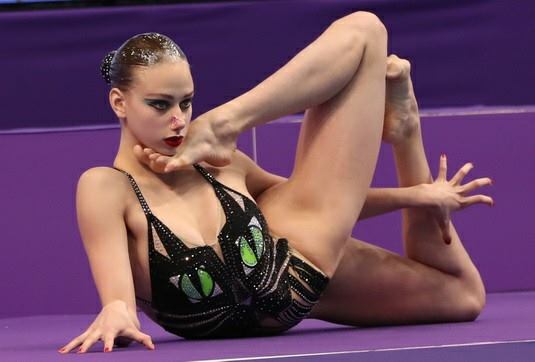
Varvara Subbotina, heir apparent of Russian synchro and of basically the entire sport, swam both technical and free solo. She absolutely and unsurprisingly crushed the competition. We had already seen her technical solo at the French Open, but judges were in a much bigger disagreement here over her last element – the Barracuda 720° – than in Paris, with scores ranging from 7.9 to 9.3. That said, she still earned 94.1510.
Subbotina also swam a free solo on the international stage for the first time since 2016, and dominated the field by scoring 95.3330, nearly three points higher than the next competitor. Her score is also essentially on par with what her teammate Svetlana Kolesnichenko obtained at the French Open in March for her free solo (95.5000), so there’s that.
It appeared her solo was on the theme of the black panther, and she showed off her ridiculous flexibility and lack-of-joint-ness. Her talent is out of this world, and I can’t wait to see her push the envelope and the limits of our sport soon.
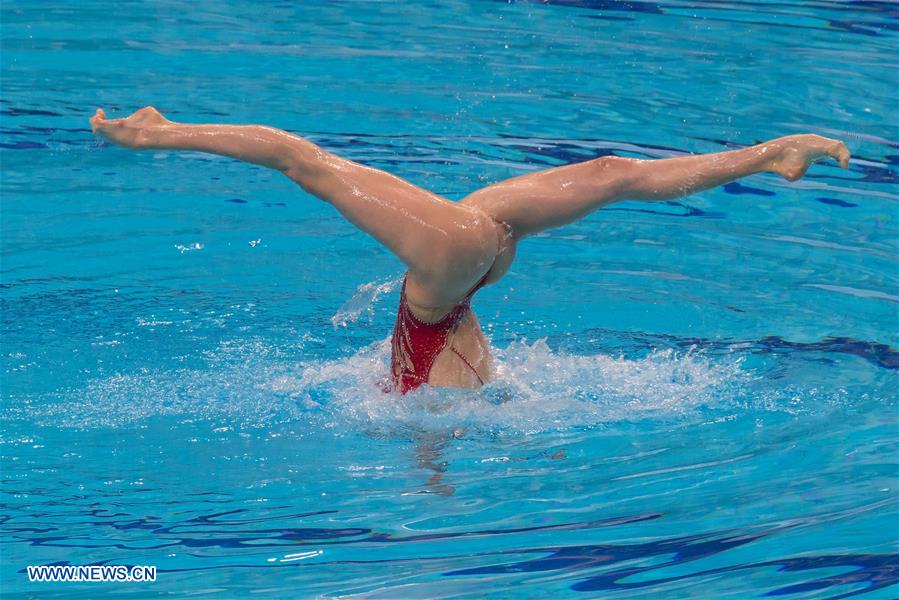
She revealed in an interview that she will be participating in the 2018 Jr. World Championships… as yes, we do need to remind ourselves she’s only 17. She is undoubtedly going to rule over that meet and probably score in the 99… Well, maybe not, but she is just way too good. It is however understandable that she will still compete in the junior category for the solo event, as Russia is very much a “you wait your turn” country with a lot of depth, and as long as Kolesnichenko is around as a senior soloist, Subbotina will just have to wait. Kolesnichenko was held out of this competition due to some nagging knee issues, but she is expected to be back for the European Championships.
Ukraine also had a fantastic showing at this competition and debuted multiple new routines across three events. The Ukrainians scored 92.0168 in technical team, which is a little over two points better than their last outing in Paris, and they are inching closer to Russia. It is hard to compare scores across competitions, but keep in mind that China obtained 92.5899 in Paris. Ukraine is improving fast, although these two countries won’t compete against one another in any major meets this season.
As expected after we saw their junior team compete the ‘Illusion’ routine last week, the Ukrainians presented a brand new free team choreography. The music is quite intense and aggressive, but they had clean swim for a first time out and continued playing with shapes and angles. They also remained outstanding in terms of throws and lifts; they opened with a sky-high double arabian (for the gymnastics experts out here), while a lift in the middle of routine involved a handstand in a straddle split position while spinning 360°. It’s amazing.
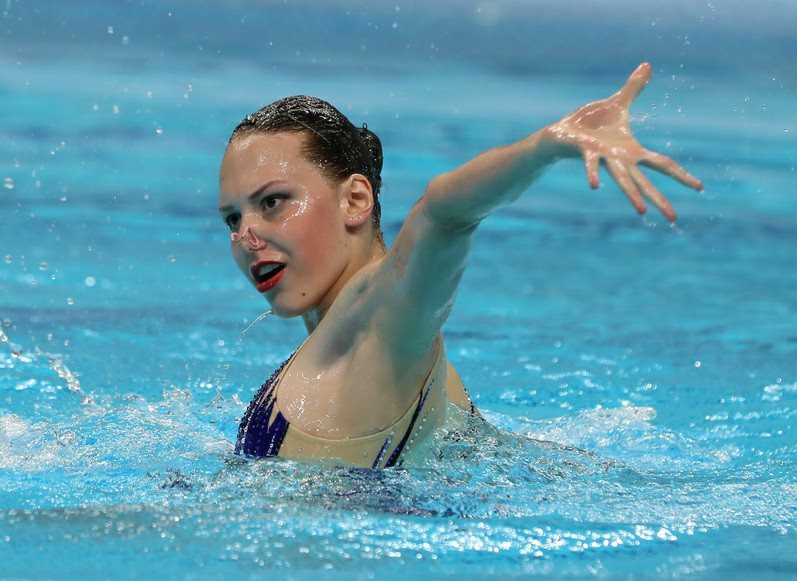
Ukraine also introduced two solos from Marta Fiedina, their latest talent born in 2002. Fiedina was already highly successful last season in the junior category, and she will likely represent the country again during this year’s junior meets. She still a bit more fragile technically than the other two (senior) soloists Yelyzaveta Yakhno and Anastasiya Savchuk, but she has a great presence in the water and is likely going to develop into a beautiful soloist. Despite her young age, Fiedina still managed fourth place in technical solo with 87.3226, and fifth in free solo with 89.8332. Keep your eyes out for this one in the next few years.
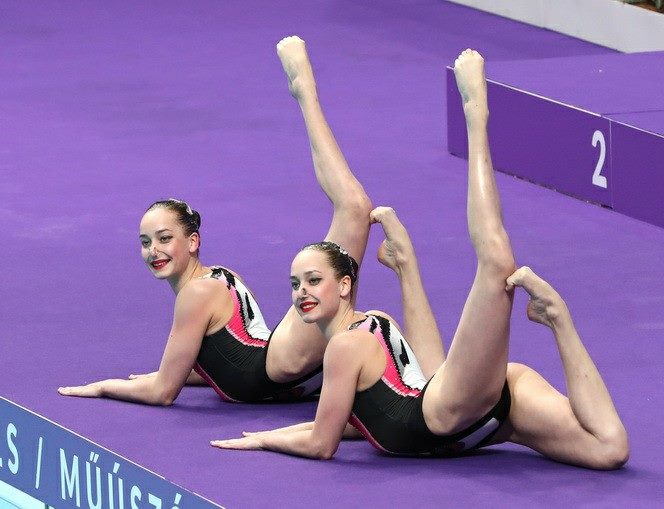
Finally, the twins Marina and Vladyslava Aleksiiva competed in both duet events and had satisfying performances. Despite a synchronization mistake in the final hybrid, they placed third in technical duet with 87.1012. The ranking was the same in free duet (88.8669), but they couldn’t earn bronze medals in either events in the FINA World Series rankings due to the one-per-country rule as their teammates Yakhno and Savchuk were ranked above. The twins are born in 2001 and are thus eligible to compete in the junior competitions this year.
Italy debuted its new technical team routine, which involved some sirens and sounds of cars racing around (…why?). The execution was good for a first time out, but there were a few synchro mistakes here and there. Their score of 88.3951 is a bit lower than last season’s, but it does match the general pattern we’ve seen of lower technical scores for many countries. However, this means we could be in for quite a battle at the European Championships later this summer between Italy and Spain, as the Spanish recently scored 89.2206 at the Japan Open. Once again, it is not ideal to compare scores across different competitions, but it is something to keep in mind.
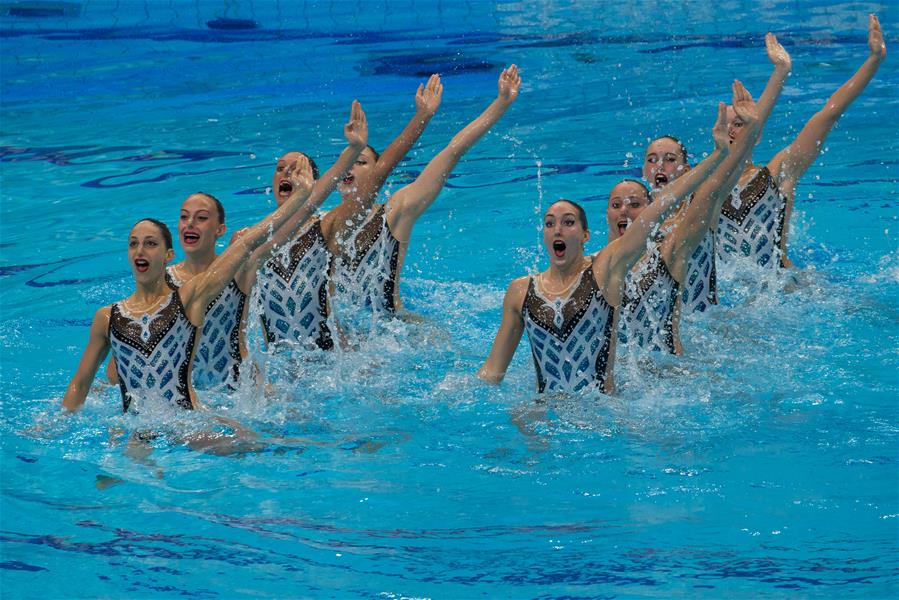
Spain was in Budapest for about five minutes to only compete in the free combination event where it won silver with 90.2000. The fight in the solo events between Austria‘s Vasiliki Alexandri and Belarus‘ Vasilina Khandoshka, another one part of that talented 2001/2002-born generation of swimmers, continued on. Alexandri did manage to move ahead of Khandoshka for the first time since worlds by 0.3 points in the free solo.
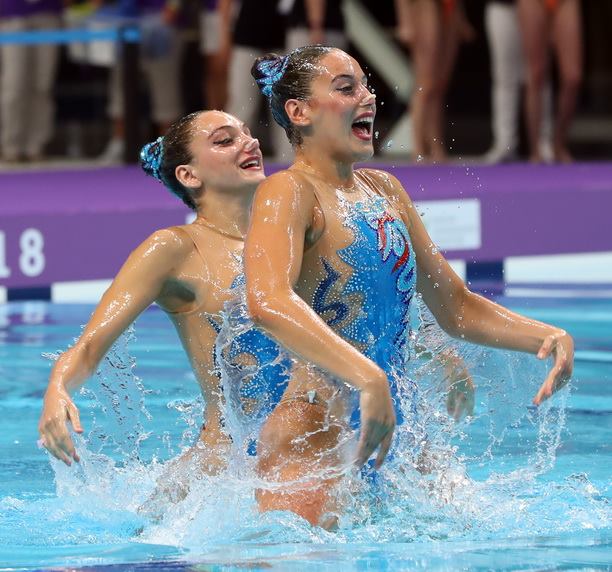
Greece sent Evangelia Platanioti in solo, but also debuted what is likely its junior duet for the season with Anna Maria Taxopoulou and Georgia Vasilopoulou. Taxopoulou was already part of the junior duet last season. The two swam in both events, and are swimming the old senior free duet choreography from the 2016/2017 season.
Switzerland had two senior duets in competition, one with Vivienne Koch and Noemi Peschl, and the other with Maxence Bellina and Maria Piffaretti. These four are likely battling it out to ultimately represent the country in the bigger meets later this year, but the latter pair represented the nation at the world championships last year.
Both duets ended up within 0.33 of each other in free, but the big difference happened in the technical event, where Bellina and Piffaretti had a clear edge. The pair of Koch and Peschl did not have a clean swim, with a mistake right from the start on their opening barracuda, and on their last technical element, the Barracuda Fishtail 360°. These two duets will compete at the Spanish Open next for the next step of the selection, and things could get interesting with a better swim from Koch and Peschl.
Israel only competed in the team events, but proved it was for real this year by scoring once again above 80 points in free team and free combination, and by improving its scores in technical team and highlight.
Article by Christina Marmet
Cover photo: Xinhua/Attila Volgyi

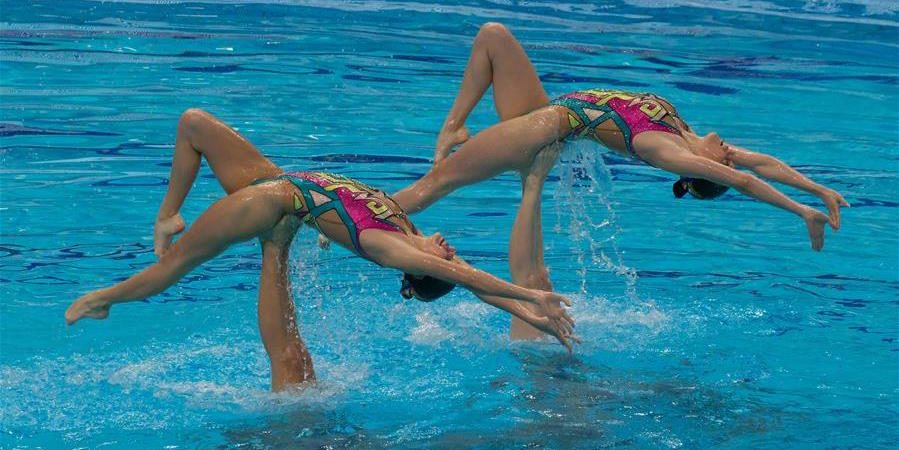
If there ever was a dirty, biased sport…. “After wonky scores last weekend in Slovakia, things were relatively back to normal in Budapest”, said by Christina Marmet. For crying out loud… This article only talks about the “Big Favorites”, speaks of “improvements” (meaning: climbing up the ranking ladder) as if it was a real improvement of athletic performance and not this whole iconic scoring system which lets the judges decide which COUNTRY takes the next medal and when. It has nothing to do with the actual performance. Any talent unfortunate enough to be born or representing a non – Favorite country just goes wasted. Years and years of hard work, throughout them really magical performances from “outsiders” and the medals still go to the athletes of the Favorites no matter what, even if they are way outclassed by other, less lucky (i.e.: not representing the Star Countries) athletes. Every international event is decided before it even gets started, points are calculated exactly, to have this or that Country further up or down in the line, regardless whether the performance is full of serious blunders or it is a flawless execution and a beautiful presentation. Nothing will change if the the judging system does not change in its whole, if the scoring does not undergo some serious clarification and objectivization so the points will be given for the real performance and not for the participating country. Any “artistic performance” judgment is part subjective of course and can be manipulated, but FINA should implement much more clear and consistent criteria for the scoring and have those criteria accessible for the participants – athletes, coaches, Federations alike. To this whole dirt and bias of the international artistic swimming scene, this article is only adding its own bias: “scores ranging from 7.9 to 9.3. Judges, do your job.”, really??? For Heaven`s sake. Maybe the only objective judge was the one giving out that 7.9? Furthermore, the article does not even mention team Hungary, the organizer of this event, and team Austria, with the participating Alexandri triplets earning medals both in the Duet and the Solo.
Hi Lilith, I actually agree with you on most of what you said about the scoring system, and yes I also do think that the judge who was at 7.9 for Subbotina was actually the most realistic one. I am sorry if you read that as in “she deserved all the 9.3” because no, her Barracuda element was not good, and such a big range in scores is unacceptable. My point was that judges need to do their job and score the element as it is. She is an incredible swimmer, but she needs to be judged like everybody else. But I agree with you, the rankings are mostly already decided before the competition even start, and there is a “swimsuit bonus” going on, so judges may be a lot more lenient if you’re one of the top nations than if you’re from a ‘smaller’ country. How to solve that, however… I don’t have an answer.
Thank you Christina. One solution to the scoring system in my opinion would be to cut any internal communication between the three separate groups of judges (elements, difficulty & artistic performance) so there would be no chance to exactly calculate totals before the points come out and manipulate that way the final score, and the second would be real-time scoring as the performance goes on, visible on screen, element by element, as they are judged on-execution, just like in figure skating. Anyhow, I think it is imperative someone comes up with a suggestion, this beautiful sport desperately needs a cleansing of the judging and scoring system.
Oh I LOVE that idea about having the real-time scoring just like in figure skating. It is certainly doable for the elements.
Dear Christina!
I would like to ask U why such a negative tone about the Slovakian leg of the World Series.
“Only 11 countries”,”after Slovakia back to normal”.Excuse me?!
How many countries participated at Beijing?Last year in Tashkent?Why U didn’t mentioned that time the number of participants?
About the low marks….well the ranking was fine,and ones U call yourself insidesynchro U should know from where the order came for the low marks.
Oh,and one more thing!There is country and athletes U never mentioned.Participating with 8-9 programs at each event,warriors,heros for me.They are the Slovak National Team members,standing at the secong place of the Team discipline by the way!
All the best!
Gábor Szauder
National Coach of Slovak Artistic Swimming TEAM!
Hi Gabor,
I apologize if I offended you in my views and opinions about the Slovakia leg of the ASWS. 11 countries certainly is a good number, and yes indeed, not many nations were in Beijing. I actually did not even write an article about the Beijing leg because I could not find any information on the competition, and the live video was awful. As for the scores, I commented on them simply by looking at the numbers and the overall trends for the nations in attendance.
Finally, I am sorry I haven’t spoken about Slovakia more, and I am truly sorry if it has hurt you and your team. It is true your team has competed so much already and it truly is remarkable. I will keep my eyes out for your next performances, and will certainly write about you guys in the future. I wish you guys all the best for the rest of the season.
Thank U Christina!